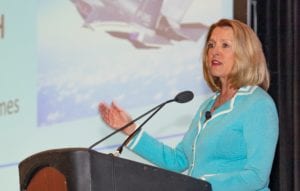Who is a member?
Our members are the local governments of Massachusetts and their elected and appointed leadership.

Former Air Force Secretary Deborah Lee James explains how municipal officials can lead in uncertain times during her keynote address at the MMA Annual Meeting on Jan. 24.
To thrive under difficult circumstances, public leaders must learn to be resilient, embrace change, and pivot when setbacks occur, former U.S. Air Force Secretary Deborah Lee James told municipal officials at the opening session of the MMA’s 41st Annual Meeting & Trade Show on Jan. 24 in Boston.
James, who had served as the 23rd Air Force secretary from 2013 to 2017 under President Barack Obama, shared lessons learned from her 35-year defense career in the public and private sectors. She said that public officials, and business executives, increasingly must lead during dysfunctional and turbulent times.
“I think change is the norm,” James said. “That is what we are living with, that is what we will be living with, and we just better get used to it and figure out how to make it work for us.”
James began her career working for the U.S. Army and then for the House Armed Services Committee in Congress. She served as an assistant defense secretary for President Bill Clinton, and spent 15 years in the defense industry before becoming only the second woman to lead a U.S. military branch. Since 2017, James has given speeches, mentored executives, served on advisory boards and wrote “Aim High: Chart Your Course and Find Success,” which was published last year.
While leading the Air Force, James managed 660,000 employees and a budget of $140 billion. Despite the enormous responsibility, James said her mission resembled that of municipal officials: being the top voice of a government entity, advocating for budgets and policies.
“You’re dealing with the taxpayer dollar … and people want to see production for that,” James said. “So the pressures to produce are extreme.”
After her time in the private sector, James had hesitated about becoming the Air Force’s leader, given the reputational risks, responsibilities and financial sacrifice involved. In particular, she worried about the level of public scrutiny the role would entail.
“People are much more quick to criticize than they are to compliment, and it is downright disheartening,” said James, who had repeatedly vowed to stop reading social media comments about herself after becoming secretary. “So public scrutiny and criticism, I think, is at an all-time high.”
But James was up to the challenge. She had coped with setbacks and evolving game plans throughout her career, including shifting gears from her dream of becoming a diplomat to working instead for the U.S. Army; conquering public-speaking fears; learning how to manage large departments; and adjusting to corporate culture after years in the public sector.
James offered three strategies for thriving, starting with charting and navigating a course for the future. She said people should have both a Plan A and a Plan B, and be prepared to pivot as setbacks and opportunities arise. They should find purpose in what they’re doing, get mentors and foster their networks, and remain positive even during tough times, she said.
“If you’re a leader, again, your job is to be able to see the opportunity within all the mess that’s happening all around you,” she said. “And make sure you are always advancing and living a life of continual learning.”
Second, people should be prepared to lead and inspire, by becoming better speakers and better listeners, and by making people feel valued, James said. They should also examine their strengths and weaknesses, she said, and lead with their strengths. And above all, they need to set a good example.
“Ethical behavior is number one,” James said. “If you sacrifice that, you have sacrificed everything. It’s a team sport, and it’s an individual sport, and don’t cut corners on ethical behavior, ever.”
And finally, James said, leaders get things done by investigating what needs to happen, communicating those needs to others, taking action, adjusting course as the situation requires, and following up.
“Follow-up needs to be relentless,” James said. “If you are the leader, it requires you to put in your personal time, and if you are repeatedly following up, if you’re putting in that personal time, absolutely the rest of your team will see that, and they too will understand that this is a change that is going to be a perpetual change.”